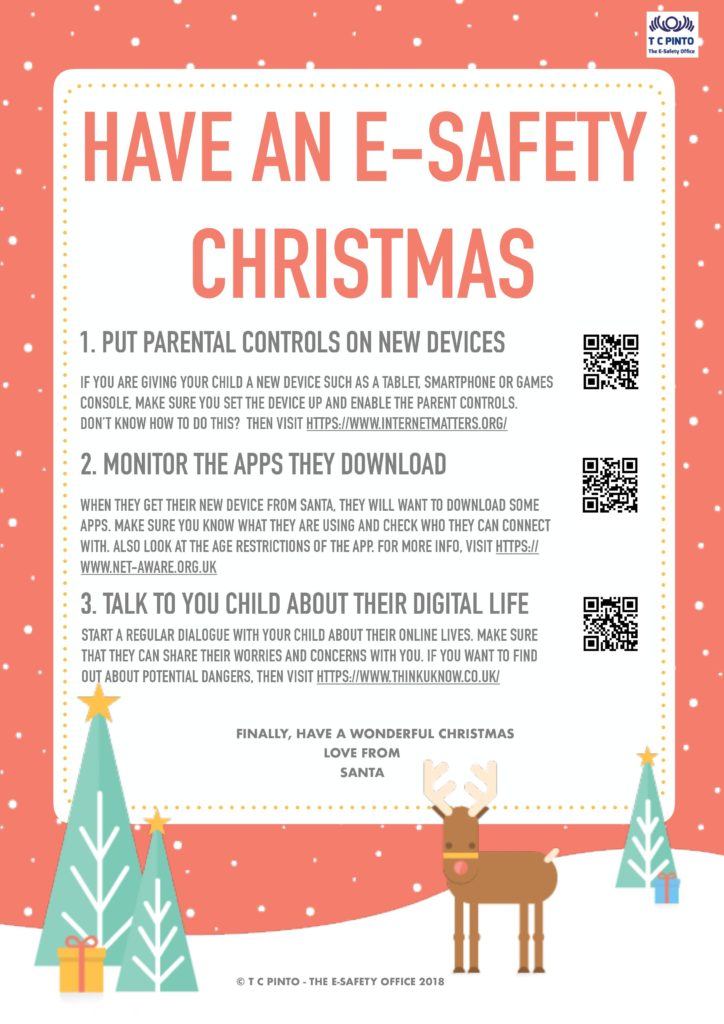 With Christmas looming, it is a busy time for parents buying presents and making sure that they will have happy faces on Christmas Day morning. Whilst traditional toys such as Lego, board games and character figures are still popular, there are an increasing number of interactive toys which are becoming more fashionable. These are usually called ‘The Internet Of Toys’ and often have internet connection through the home wifi and an associated app for further functionality.
With Christmas looming, it is a busy time for parents buying presents and making sure that they will have happy faces on Christmas Day morning. Whilst traditional toys such as Lego, board games and character figures are still popular, there are an increasing number of interactive toys which are becoming more fashionable. These are usually called ‘The Internet Of Toys’ and often have internet connection through the home wifi and an associated app for further functionality.
In addition, smartphones, tablets and games consoles are also popular choices for many children. In my recent talks with children in primary schools, it is not uncommon to find 7 or 8-year-olds with their own smartphone. Also, many children have easy access to a tablet, and these are now a tool to play games, watch movies and take pictures.
So, we know that technology toys and devices will be a popular choice this Christmas, but how can parents make them safer? As in the old Christmas song, here are the 12 Tech Tips for having a happy holiday:
- Buy wisely as there are many options for purchasing interactive toys and devices and it is important that parents look at the suitability of different devices for their child. For instance, some companies such as Amazon make a ‘kids’ specific tablet which includes a child-friendly web browser and limits content that can be downloaded to the device.
- Before the big day, it is recommended that you set the device up so that parental controls (see next tip) are enabled. This will give you peace of mind over the Christmas period.
- If you purchase an interactive toy or device, look at what parental controls are built in. Many devices enable parents to control screen time and limit functions on the device. A useful site to look at parental controls is Internet Matters (https://www.internetmatters.org/parental-controls/)
- Parents can limit what their child can access on their home broadband. Family-friendly filtering is a good way to monitor your child’s access of online content. Contact your broadband provider for further support.
- Apps are keyway that children access software e.g. games on tablets and smartphones. Look at the parental controls to ensure that they cannot download an app before you approve its suitability. When you look at whether an app is appropriate for your child, check the age ratings on the App or Play Store.
- Games consoles are popular with many children and we have to remember that we use a cinema-style classification for video games. The PEGI Ratings system highlight what games are suitable for children. These are classed as 3,7,12,16,18. Also, games have icons on the back of the cover to highlight what content is included in games. A useful site is Ask About Games (https://www.askaboutgames.com/pegi-rating/)
- You Tube is an incredibly popular platform that children use, however we need to be aware that some of the videos on the site can be unsuitable for children. Google have brought out an alternative site for young children called You Tube kids ( https://bit.ly/2PQHqKx) and Common Sense Media (US Site) has some really useful tips here: https://www.commonsensemedia.org/blog/parents-ultimate-guide-to-youtube
- It is important that children know who they can talk to if they are worried about something that happens on the internet. Due to different work patterns, parents may not always be around so it is important that you speak to your child and make a list of the trusted adults they can speak to.
- A concern over the past couple of years has been about screen time. This relates to the fact that children can be immersed using different devices and easily can spend hours looking at different screens. The Chief Medical Officer in the UK released some advice highlighting that children should not take gadgets to bed with them, devices should be banned at mealtimes and children need to have a balanced lifestyle ensuring that they exercise and do other activities such as read, play board games and engage with arts and crafts.
- Streaming services such as Netflix, BBC IPlayer and Amazon Prime are popular, as they offer a range of movies and programmes that children enjoy. If you want to ensure that your child is watching suitable content, look at the specific settings to control what they watch.
- Children like taking pictures (often called selfies) and it is important that you know who they are sharing them with. Apps like Snapchat and Instagram are rated 13+, so speak to your child about not sharing images unless you give consent.
- Finally, the most important way you can support your child in the digital world, is to talk to them. Over the Christmas period, sit down with them and talk to them about what they do online. Let them show you the sorts of apps and games they like using and as the new year begins, set some time aside for digital family time.

Have a very Happy Christmas and New Year
Tim Pinto
Director – The E-Safety Office (https://esafetyoffice.co.uk/)
 With Christmas looming, it is a busy time for parents buying presents and making sure that they will have happy faces on Christmas Day morning. Whilst traditional toys such as Lego, board games and character figures are still popular, there are an increasing number of interactive toys which are becoming more fashionable. These are usually called ‘The Internet Of Toys’ and often have internet connection through the home wifi and an associated app for further functionality.
With Christmas looming, it is a busy time for parents buying presents and making sure that they will have happy faces on Christmas Day morning. Whilst traditional toys such as Lego, board games and character figures are still popular, there are an increasing number of interactive toys which are becoming more fashionable. These are usually called ‘The Internet Of Toys’ and often have internet connection through the home wifi and an associated app for further functionality.